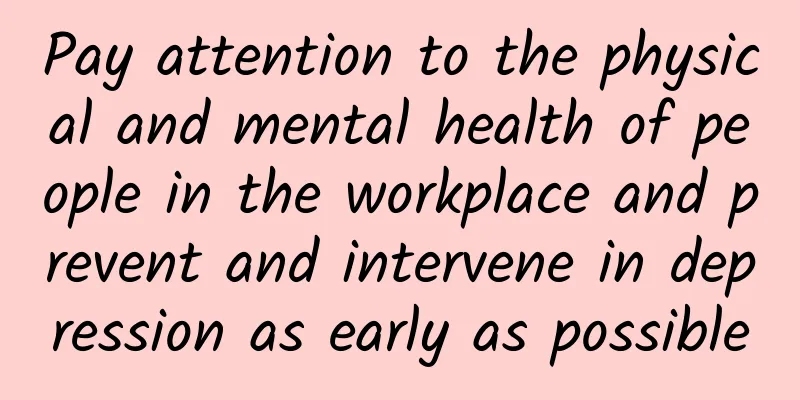Pay attention to the physical and mental health of people in the workplace and prevent and intervene in depression as early as possible

|
With the increasing demands and competitive pressure on professionals in modern society, the workplace has gradually become a high-incidence area for depression. The 2022 edition of the "China National Mental Health Development Report (2021-2022)" released by the Institute of Psychology of the Chinese Academy of Sciences shows that abnormal work status is an important factor affecting mental health, among which work burnout has a more prominent impact on the risk of depression. In the group with severe work burnout, the detection rate of depression risk exceeds 40%. Depression not only has a negative impact on the patient's physical and mental health, but also has a great impact on their work performance and quality of life. Professor Li Qiang As the May Day approaches, the reporter of China Business Network specially interviewed Professor Li Qiang, chief physician of the Department of Psychiatry and Psychology of the First Affiliated Hospital of Xi'an Jiaotong University, hoping that through the expert's answer, the society can be called upon to care about the mental health of people in the workplace, provide more popular science knowledge on mental health for people in the workplace, and increase their attention to their own mental health. Cognition: The treatment needs of people with depression in the workplace need to be met urgently Currently, depression is characterized by high prevalence, high disability rate, and high recurrence rate. According to epidemiological survey results, the prevalence of depression in China is 3.4%, with approximately 50 million patients requiring standardized medication treatment; the recurrence rate of the disease is as high as 50% to 85%, of which 50% of patients will relapse within 2 years after the onset of the disease, which has become an important factor affecting family life and social productivity. Professor Li Qiang introduced that the clinical manifestations of depression are quite diverse, manifested in low mood, unhappiness, unhappiness, depression, slow reaction, inability to remember things, slow thinking, etc. in daily life. For example, students cannot concentrate in class and cannot listen; people in the workplace have reduced work efficiency and chaotic minds. In addition, patients with depression have reduced speech, movements, and activities, slower speech speed, fear of going out and seeing people. These are the emotional and cognitive symptoms of depression. In more serious cases, they may have negative, pessimistic, and suicidal thoughts. "In addition to affecting emotions and cognition, depression also has many physical symptoms. The most common symptoms include gastrointestinal reactions, loss of appetite, palpitations, chest tightness, shortness of breath, as well as unexplained pain and insomnia." Professor Li Qiang introduced that due to the diversity and complexity of clinical manifestations, patients often wander around various departments of the hospital, but the examination results show normal. The symptoms complained by the patients are not supported by medical examinations, which has become an objective factor in the high misdiagnosis rate of depression. Even if patients are diagnosed with depression, the treatment effect is often unsatisfactory. Studies have found that the incidence of residual symptoms after treatment of depression patients is about 30% to 50%. Common residual symptoms include anxiety, cognitive impairment, fatigue, anhedonia, etc. Professor Li Qiang believes that the number of residual symptoms is closely related to the patient's social function and quality of life: the more residual symptoms, the more serious the patient's social function is impaired, and the lower the patient's quality of life satisfaction and medical satisfaction are. The more chronic the course of the disease is, the higher the suicide attempt will be. Professor Li Qiang emphasized that for those working in the workplace with high social demands and high work intensity, it is particularly urgent to reduce the negative impact of residual symptoms on normal work and life. In addition to residual symptoms, patients with depression who receive medication also face subjective pain and physical comorbidities caused by adverse drug reactions. Sexual dysfunction, weight gain, and drowsiness are all common adverse reactions to antidepressant medication. Studies have shown that more than 80% of patients have experienced at least one adverse reaction, and each patient has experienced an average of four different adverse reactions. Many patients stop taking the drug on their own due to drug intolerance, or even resist treatment from the beginning, which greatly affects the treatment effect. Attention: Multiple factors lead to high incidence of depression among workers There are many reasons for workplace depression, including work pressure, social environment and many other factors. Long-term repetitive work, lack of self-realization, lack of support and recognition and other factors may also lead to workplace depression. In addition, some occupational diseases such as eye fatigue caused by frequent exposure to computer screens and back pain caused by incorrect sitting posture can also make people depressed. Mr. Zhang (pseudonym), 47 years old this year, has been diagnosed with depression for more than 20 years. At that time, he was diagnosed with depression because of the pressure of finding a job after graduation. After standardized treatment, his condition improved and he found a stable job. However, during the epidemic, his depression relapsed, and he developed symptoms such as low mood, severe insomnia, and pessimism. After using drug intervention, residual symptoms appeared, and his mood never returned to its original state, accompanied by drug side effects such as increased blood pressure and headaches. In Professor Li Qiang's view, residual symptoms and adverse reactions are not ordinary words, but stumbling blocks to standardized antidepressant treatment, especially for patients in the workplace. Even mild residual symptoms and adverse reactions will greatly affect the patient's self-evaluation and work performance. Professor Li Qiang introduced that although Mr. Zhang's pessimistic and negative emotions have been reduced after receiving antidepressant treatment, he does not have too many positive emotions, and the side effects of the drugs after taking the drugs still cannot allow him to return to normal work. Like many patients with workplace depression, Mr. Zhang still expects better treatment results and is eager to restore his work status and quality of life before the disease. Treatment: Innovative drugs provide new options for patients At present, drug therapy is one of the main treatments for depression. Although previous antidepressants are generally effective, there are still a wide range of unmet treatment needs, including low clinical cure rates and residual symptoms after treatment. The clinical demand for new antidepressants is still urgent. On November 1, 2022, the National Medical Products Administration approved Ruoxinlin (torudivenlafaxine hydrochloride sustained-release tablets) for the treatment of depression, bringing new treatment options to patients. Clinical studies have confirmed that Ruoxinlin can comprehensively and stably treat depression, significantly improve patients' anxiety, blockage/fatigue symptoms, anhedonia and cognitive ability, and promote the recovery of social functions; it also has good safety and tolerability, does not cause drowsiness, and does not affect sexual function, body weight and lipid metabolism. It is expected to improve the current treatment status of the disease and help patients return to and integrate into society. Professor Li Qiang analyzed that most antidepressants are only effective on two transmitters, 5-hydroxytryptamine (5-HT) and norepinephrine (NE), but have less intervention on dopamine (DA), which is why the patient Mr. Zhang's mood did not return to its original state after taking antidepressants. After switching to Ruoxinlin, Mr. Zhang reported that his mood improved more significantly than the previous treatment, his whole person's thinking was agile, his body was energetic, and his anxiety and irritability decreased. In terms of adverse drug reactions, the patient's blood pressure was normal, his sexual function was not affected, his weight dropped by 4 kg, he was not sleepy, and he could devote himself to work better. Suggestion: Early prevention, early intervention and stay away from negative emotions Professor Li Qiang believes that when people in the workplace are overworked and have high demands on themselves, they are under great pressure, which can easily lead to various physical and psychological symptoms, such as insomnia, anxiety, persistent sleepiness, lack of motivation, and even headaches and vomiting, which may be related to depression. However, due to the lack of correct understanding of the disease in society, patients are often shrouded in a sense of shame and are unwilling to disclose their condition, let alone actively seek effective treatment. They can only stay in a "secret corner" and let their condition worsen. In order to prevent and treat workplace depression, you need to focus on self-regulation and maintain a good attitude at work. Professor Li Qiang reminded that in daily life, arranging time reasonably, developing exercise habits, participating in more social activities, and maintaining a healthy diet and work and rest schedule can all help prevent workplace depression. In addition, you can also seek psychological counseling, reduce work pressure, and find support to relieve depression symptoms and regain the joy of life. Finally, Li Qiang called on everyone to pay attention to their own health, take early prevention and intervention, and work together as a society to create a healthier and better living environment. |
Recommend
Is female sexual indifference caused by kidney deficiency?
Many people have the idea that men's sexual d...
How to treat uterine cold infertility?
Women are born with the right and responsibility ...
My stomach is very hard as my due date is approaching
If your belly is hard during pregnancy, you shoul...
Introduction to multiple breast tumors
Nowadays, women are under more and more work pres...
How many months is the best time to do four-dimensional color Doppler ultrasound?
At which month of pregnancy is it best to do a fo...
What is the reason why girls grow leg hair?
If a girl finds that there is a lot of hair on he...
I am still leaking urine two and a half years after giving birth.
The creation of life is the sweetest moment in a ...
Another wave of respiratory infections coming? What to do if you test positive for Streptococcus pneumoniae?
"I avoided mycoplasma and influenza, but was...
What colors are suitable for autumn nail art? What should I do if my newly done nail art is split?
If the nail color is well done and matched with t...
Exercises to tighten your vagina
We know that sex life in modern society is not ju...
What causes bleeding after sex?
Many women experience vaginal bleeding during sex...
How should I wash my face if I have acne? What should I pay attention to in my diet?
Author: Cai Lin, Chief Physician, Peking Universi...
Normal blood pressure range for a 30-year-old woman
Once women reach the age of 30, they will become ...
How long should I wear a belly band after a caesarean section?
During pregnancy, the skin on a woman's belly...









